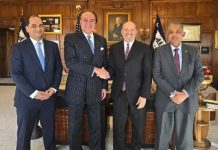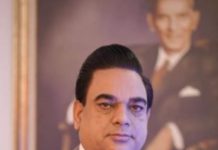ISLAMABAD, AUG 11: The Pakistan Industrial and Traders Associations Front (PIAF) has proposed a collaborative approach between the government and the business community, stressing the government to engage with industry stakeholders to formulate successful economic strategies.
The PIAF (Anjum Nisar group) Chairman Faheemur Rehman Saigol said that this collaboration is especially crucial in this economic unstable condition. It is imperative that the government involves the business community in shaping economic policies, he asserted. He argued that aligning the interests of the government and businesses is essential for creating an economic framework that is not only robust but also sustainable in the long run.
At the core of national progress lies a well-defined economic agenda, he stated, underscoring the importance of a cohesive plan to put the economy on a track of sustained growth. He stressed that economic stability is paramount for addressing various societal challenges and fostering an environment conducive to prosperity. Media reports called for a fully-fledged and sound plan with a highly competent team to handle local challenges forthwith, but unfortunately, they have no solid plans or directions. He foresees this year full of challenges for businesses and industries in Pakistan due to political uncertainty on global and local fronts. The government should come up with drastic measures to give confidence to local industrialists-cum-entrepreneurs and foreign investors through industry-friendly and investment-friendly policies.
A cornerstone of the proposed economic initiatives is the advocacy for a comprehensive 5-year export policy. He emphasised that such a policy would provide a roadmap for enhancing the country’s global competitiveness. He outlined that a strategic export policy is vital for diversifying the economy, creating job opportunities, and ensuring a steady influx of foreign exchange. He said that PIAF serves as a rallying cry for a united effort towards economic progress. The call for transparent economic strategies, international engagement, and a collaborative approach between the government and the business community underscores the urgency of prioritising economic development for the collective well-being of the nation. Faheemur Rehman Saigol said all political parties should provide their economic stability plans to avert further losses and delays, warning that numerous global issues are impacting world economies. He said the upcoming government should prioritise resolving the energy crisis by providing sufficient and affordable electricity and gas to industries. The import bill should be reduced by imposing bans on luxury products. He highlighted controlling inflation to ensure affordable living costs for the masses and containing the cost of production for businesses at a local level.
The PIAF chief observed that besides increasing exports and controlling imports the government will have to take administrative measures, as a large demand of cash dollars are seen in the market. He argued that this devaluation of the currency was dictated by the IMF through prior actions and it has nothing to do with macro-economic fundamentals. He said that there was a complete breakdown of economic policymaking, as the country’s fiscal policy had become subservient to monetary and exchange rate policies. He said that the monetary tightening and exchange rate depreciation resulted in higher inflation, public debt and debt servicing.
The government needs to devise a strategy on war-footing to increase foreign investment in Pakistan so as to stop the upward trajectory of the dollar, he added. The rupee during through the whole year remained uncertain, as the uncertainty pertaining to the IMF program was causing pressure on the Pakistani rupee while the country’s foreign exchange reserves have also declined, which was another source of concern for investors, he said.

















